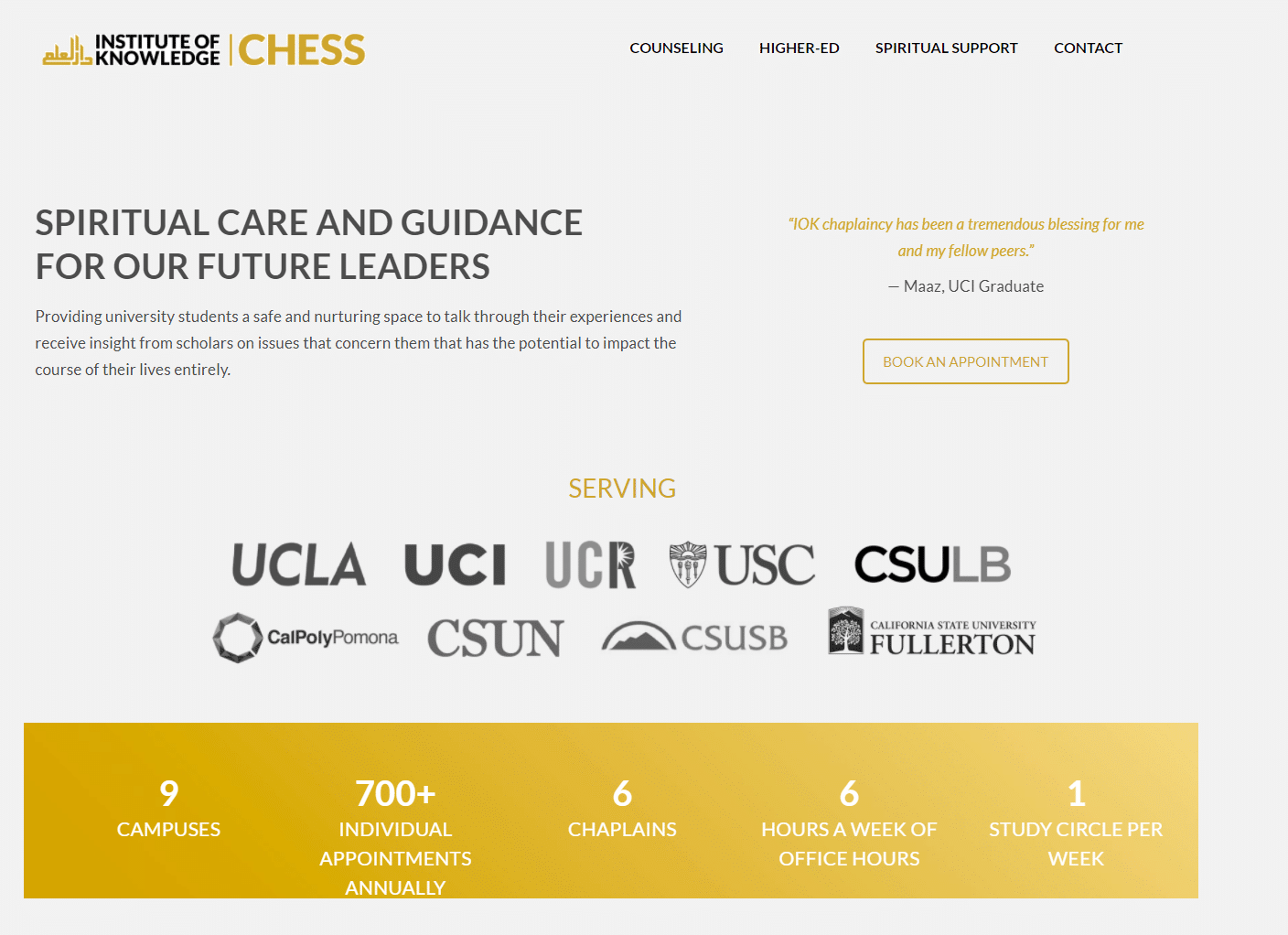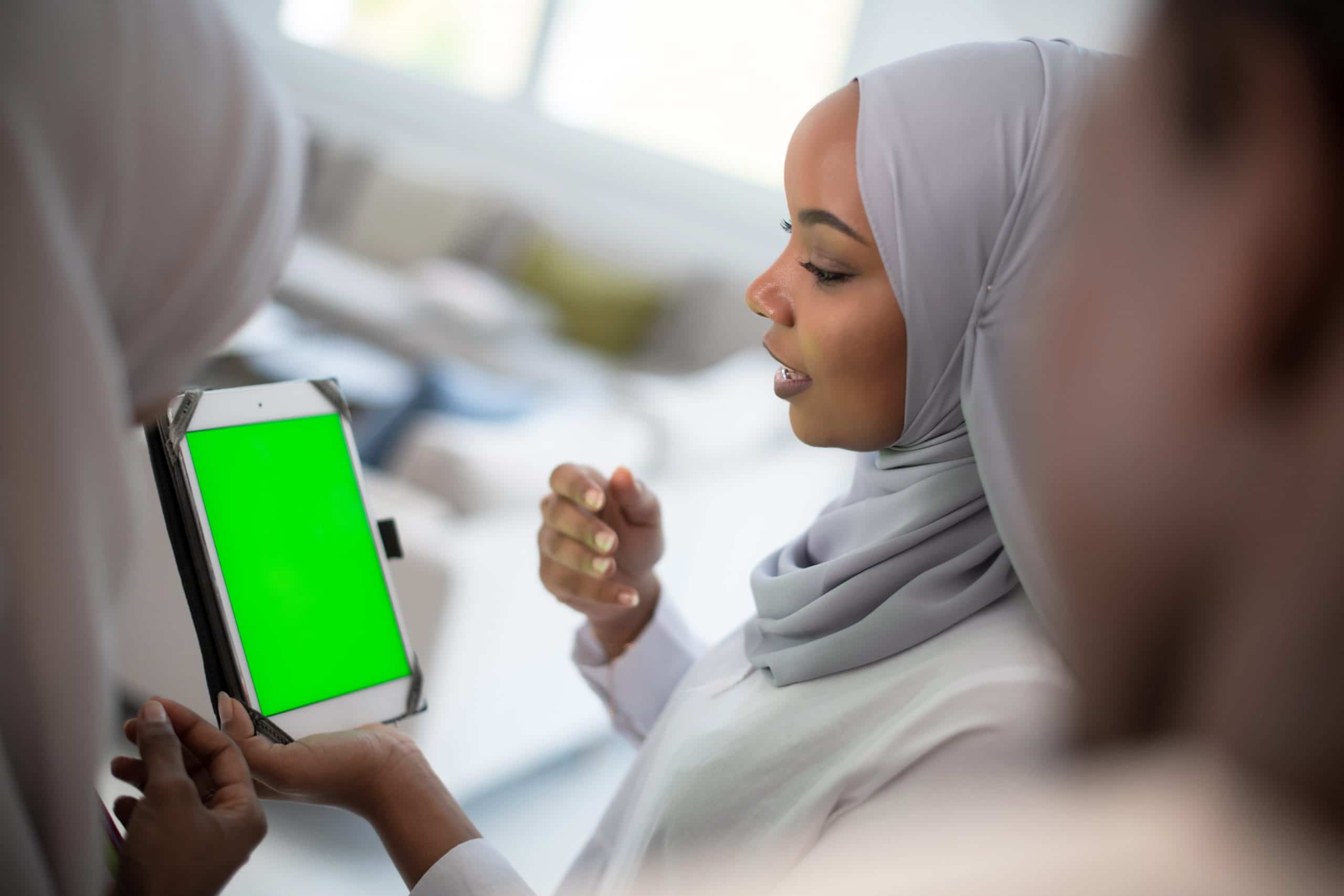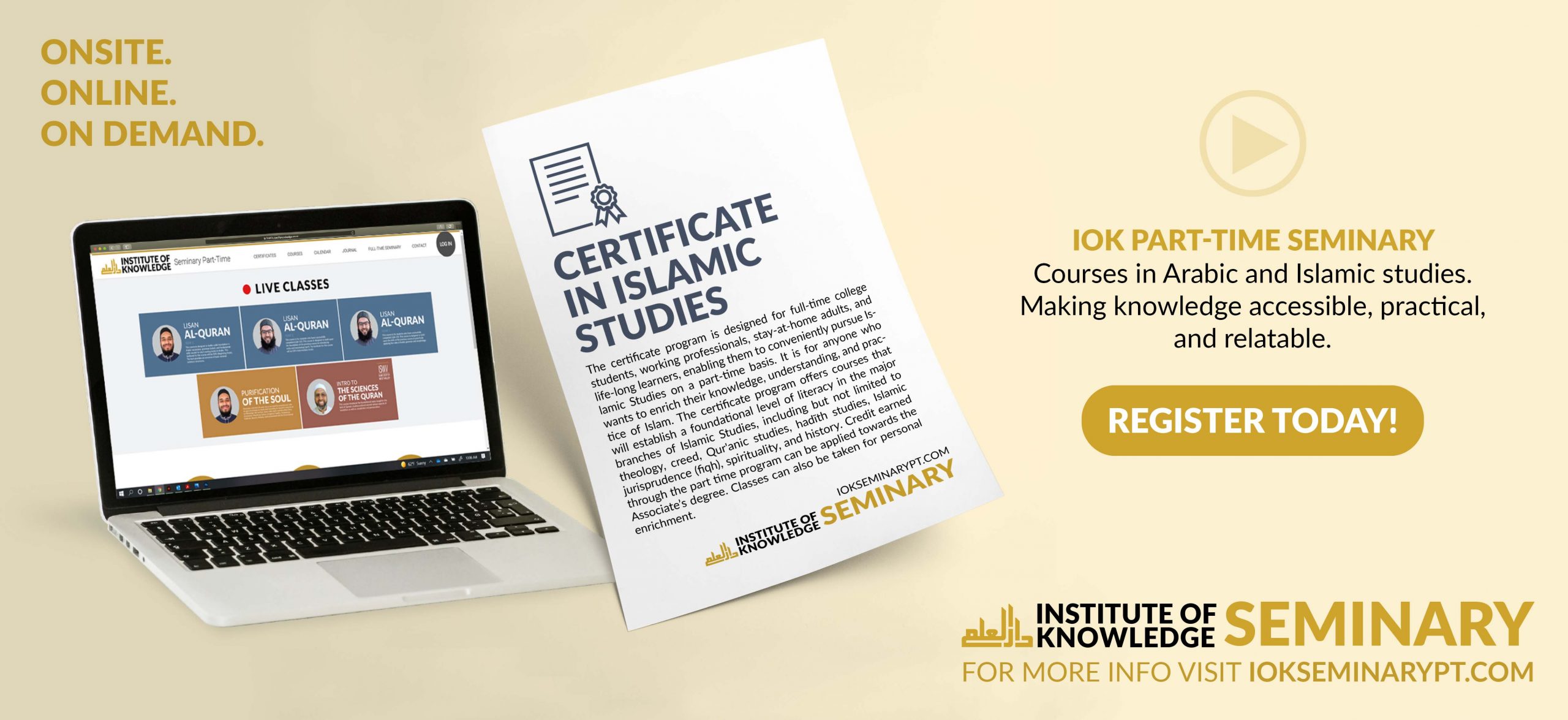#Society
From The Chaplain’s Desk: Welcoming IOK Chaplaincy To MuslimMatters

Published

MuslimMatters is thrilled to announce a collaboration with the Institute of Knowledge (IOK) Chaplaincy Initiative: From the Chaplain’s Desk. Join us the last Saturday of every month on MuslimMatters to hear the IOK Chaplains tackle a difficult issue, share advice, or present valuable information relevant to college students.
We know that most Muslim students attend colleges in which there is no Muslim chaplain to turn to, and we hope this is an outlet which can offer some support to Muslim students who are in communities which haven’t provided them with chaplaincy resources. Stay on the lookout every month for the segment “From the Chaplain’s Desk” published on MuslimMatters! But in the meantime, let us introduce you to the IOK Chaplaincy Initiative.
What is Chaplaincy and Why Does it Matter?
Keep supporting MuslimMatters for the sake of Allah
Alhamdulillah, we're at over 850 supporters. Help us get to 900 supporters this month. All it takes is a small gift from a reader like you to keep us going, for just $2 / month.
The Prophet (SAW) has taught us the best of deeds are those that done consistently, even if they are small. Click here to support MuslimMatters with a monthly donation of $2 per month. Set it and collect blessings from Allah (swt) for the khayr you're supporting without thinking about it.
A chaplain is generally a faith-based individual who provides spiritual care and support in secular environments such as prisons, hospitals, universities, and the armed forces. The word itself comes from the Latin word for a cloak, and part of the metaphor of chaplaincy is the imagery of “cloaking” someone in the care and support they need in order to work through the various challenges they may be going through.
The primary emphasis of chaplaincy is on pastoral care. The idea of pastoral care comes from the concept of the spiritual caregiver as “Pastor”; the one who takes the sheep out to the pasture to graze, and cares for them in that journey. Although these terms are ones that are commonly used in an American socio-cultural context, they are not always well-known in the Muslim community.
The idea of pastoral care is completely in line with the Islamic tradition because we know, from our beloved Messenger ﷺ, that God did not send a Messenger except that he worked as a shepherd, a pastor. The Prophet ﷺ said, “Allah did not send a prophet except that they grazed sheep” [Bukhārī, k. al-ijārah, b. raʿy al-ghanam ʿalā qarārīṭ, 2262.] Certainly there is divine wisdom in that decree and there are specific qualities one learns as a shepherd/pastor that are necessary for the prophetic missions, such as patience, tolerance, attention, bravery, and self-sufficiency.
We know from our tradition that our beloved Messenger ﷺ served many different roles in his life. He was a teacher, an advisor, a caregiver, and a shepherd to his people. This is essentially what the role of chaplaincy is about. The Chaplain may serve as an educator, a friend, and a mentor, but throughout it all, they are a constant and regular source of spiritual upliftment and nourishment for those they serve.
The role of a chaplain is critical in university settings in the West because the challenges faced by Muslim students on college campuses are immense. Regardless of religious or cultural background, college is a time of great upheaval, and for Muslims it can be extra challenging. For many, it is their first time away from home and their first time being introduced to a world of concepts, ideas, and temptations that have not directly challenged them before that point in their lives. College is also one of the most defining time periods in a person’s life. The experiences in college shape and mold a person’s beliefs, character, and worldview. In short, it’s a time when we as a community need to be there for them. The challenges are not ones that can be solved or properly faced through online videos, but rather require in-person attention over extended periods of time. That is what the IOK Chaplaincy program seeks to provide.

IOK Chaplaincy
In our chaplaincy program, we look for three major qualities in our chaplains. The first is a strong seminary background, basically people who have studied Islam formally and traditionally and are qualified to pass that on to those whom they serve. The second is that they themselves have graduated from local universities and can relate directly to the experiences of the students they serve. The third is that they engage in continuous education and training in mental health, pastoral care, and conflict resolution. We believe that these three qualities enable our chaplains to connect, understand, and appropriately aid in the various challenges that students deal with.
IOK is working diligently to provide well-qualified chaplains. In the general field of chaplaincy, service providers are expected to have completed a seminary education as well as a specialized program in chaplaincy that includes academic and field work. In the Muslim community, it is not uncommon to find chaplains having the chaplaincy training but not the seminary training. This is largely due to lack of resources and our more recent entry into the field as compared to those from Jewish or Christian backgrounds. In the case of our chaplains, we have people who have completed extensive seminary education, have years of community experience, but have not necessarily completed a specialized program in chaplaincy in the western context. However, traditional seminary programs include extensive training in what is known as chaplaincy work and pastoral care. . Furthermore, our chaplains supplement their skills through continuous education and training in mental health, counseling, and pastoral care through various local and national organizations.

The Main Focus of Our Work
We draw the main areas of focus of our work from a set of descriptions of the Messenger repeated in several places in the Quran. One of those places is verse [62:2]: “It is He who has sent among the unlettered a Messenger from themselves reciting to them His verses and purifying them and teaching them the Book and wisdom–although they were before in clear error–” In this verse, God mentions three major tasks of the blessed Messenger: guidance, spiritual care, and education. These are the main areas we focus on in the IOK Chaplaincy Initiative.
Spiritual Care and Guidance
Spiritual care and guidance are very personal matters, so the bulk of what the chaplains do in this regard is through weekly office hours on each campus. Students who would like to speak to the chaplains about any issue that may be concerning them can book a time and discuss whatever they would like, in an environment of compassion and confidentiality. Conversations have ranged from family to marriage to school to advice on living by the teachings of Islam. These opportunities for dedicated support and attention are what the core of the work is about and where the best relationships with the students are built. In fact, the hours are not limited to only when people have major issues or crises, but some students schedule on a weekly or every-other-week basis, simply to sit and talk in general and spend time together. In addition, the chaplains are available by phone and email. This allows them to be more easily reached in case of any urgent issues that come up. It also allows an added layer of privacy, which some have found useful when asking about issues in which they need advice, but do not want the chaplains to know who they are.
Education
The core of our educational support to Muslims on campuses is in the form of weekly study circles and general lectures. The approach in these circles is up to the individual chaplain’s discretion in consultation with the students being served. The idea is to pass on traditional knowledge to the students in a manner that is practical and relevant to their daily lives and experiences. We have:
- utilized our traditional academic training in selecting appropriate topics
- relied on works of Muslim scholars, past and present, local and international
- developed and published our own materials covering Quranic Studies, Hadith Studies, Usul al-Fiqh, Tafsīr, and an accessible commentary on Imam al-Nawawi’s Forty Hadith (all the titles can be found here).
Another way that education takes place on campus with students is informally through office hours or simply spending time around campus. Sometimes there is more educational impact in the informal conversations and gatherings than classes.
Campus Outreach
Campus outreach includes both interfaith work and general campus outreach to administration, staff, and professors. The interfaith communities are natural allies for the Muslims on campus and when the opportunities arise, the chaplains work to develop relationships of mutual respect and understanding. In addition, there are many other factors that affect Muslim student life on campus, where the role of the chaplains becomes important. Whereas the work students and student organizations do building these relationships are always in flux, the position of the chaplain allows for some stability in relationship building, which is very important for developing influence over time. In our roles, we meet with campus administration, faculty, staff, and other groups to improve student life for Muslims on campus.
Companionship
We believe the primary way Islam has been passed from generation to generation throughout the years is through personal relationships. As simple as it sounds, these relationships are not always easy to build in a time when people are more accustomed to dealing with one another from behind screens rather than in person. This is an area of the work that is hard to quantify, but it is critically important. We must spend time with one another and we must create opportunities as a community for our youth to spend time with those who have traveled the roads they are traveling and can provide insight and perspective for them. This is a role that we take seriously and we are all so grateful for the wonderful and inspiring young people we have had the opportunity to get to know through this aspect.
You can read the 2017-18 Impact Report to learn more about our work’s positive outcomes.
Who do we Currently Serve?
Our chaplains, who are also traditionally trained scholars, serve nine campuses throughout Southern California:
- University of California, Riverside
- University of California, Irvine
- University of California, Los Angeles
- University of Southern California
- Cal State University, Pomona
- Cal State University, Long Beach
- Cal State University, San Bernardino
- Cal State University, Fullerton
- Cal State University, Northridge
And last but not least, IOK Chaplains are now reaching a global network of students through MuslimMatters! We’re so blessed to begin this journey with the IOK Chaplains and we hope you’ll join us inshaAllah.
Keep supporting MuslimMatters for the sake of Allah
Alhamdulillah, we're at over 850 supporters. Help us get to 900 supporters this month. All it takes is a small gift from a reader like you to keep us going, for just $2 / month.
The Prophet (SAW) has taught us the best of deeds are those that done consistently, even if they are small. Click here to support MuslimMatters with a monthly donation of $2 per month. Set it and collect blessings from Allah (swt) for the khayr you're supporting without thinking about it.
The IOK Chaplains work for the Institute of Knowledge Chaplaincy Initiative. Formally trained in Islamic seminaries, they work to provide spiritual and pastoral care to Muslim college students in Southern California.


Nationalism And Its Kurdish Discontents [Part II of II]: Kurds And Turkiye After Ottoman Rule

Nationalism And Its Kurdish Discontents [Part I of II]: Kurds In An Ottoman Dusk

Moonshot [Part 10] – The Marco Polo

Moonshot [Part 9] – A Religion For Real Life

Genocidal Israel Escalates With Assault On Iran

Moonshot [Part 9] – A Religion For Real Life

Moonshot [Part 10] – The Marco Polo

Moonshot [Part 8] – The Namer’s House

Moonshot [Part 7] – The Abyss Stares Back

[Dhul Hijjah Series] Calling Upon the Divine: The Art of Du’a (Part 3)

[Dhul Hijjah Series] Calling Upon the Divine: The Art of Du’a (Part 1)

IOK Ramadan 2025: Four Steps | Sh Zaid Khan

IOK Ramadan 2025: Do Your Best | Sh Zaid Khan

IOK Ramadan 2025: Giving Preference to Others | Sh Zaid Khan




